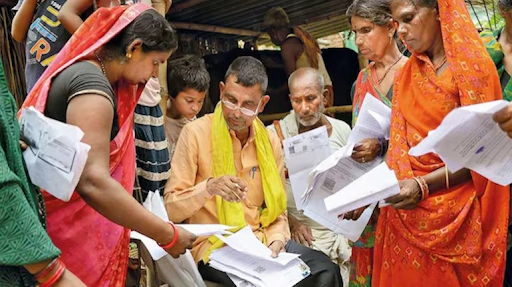Description

Copyright infringement not intended
Picture Courtesy: tribuneindia
Context: The President of India has appointed Justice Sanjiv Khanna, the senior-most judge of the Supreme Court, as the Executive Chairperson of the National Legal Services Authority (NALSA).
National Legal Services Authority (NALSA)
- The National Legal Services Authority (NALSA) is a statutory body established under the Legal Services Authorities Act 1987.
- The main objective of NALSA is to provide free legal services to the weaker sections of society and to organize Lok Adalats for amicable settlement of disputes.
Features of NALSA
- NALSA is headed by the Chief Justice of India, who is the Patron-in-Chief, and a senior judge of the Supreme Court, who is the Executive Chairman.
- It has constituted State Legal Services Authorities (SLSAs) in every state, headed by the Chief Justice of the respective High Courts, and District Legal Services Authorities (DLSAs) in every district, headed by the District Judge of the respective district.
- It provides free legal services to eligible persons, as defined in Section 12 of the Act, which include women, children, SC/STs, disabled persons, victims of natural disasters or violence, persons in custody, etc.
- It organizes Lok Adalats at various levels, which are alternative dispute resolution mechanisms where cases are settled through conciliation and compromise.
- It undertakes various schemes and programmes for legal awareness, legal literacy, legal aid clinics, panel lawyers, para legal volunteers, etc.

Significance of NALSA
- It plays a vital role in ensuring access to justice for all, especially for the poor and marginalized sections of society, who otherwise may not be able to afford legal services or approach courts.
- It helps reduce the burden on the judiciary by resolving disputes through Lok Adalats, which are speedy, inexpensive and informal methods of justice delivery.
- It empowers people with legal knowledge and awareness, which enable them to assert their rights and seek remedies for their grievances.
- It promotes a culture of justice and harmony in society by facilitating amicable settlement of disputes and fostering social justice.
Steps taken to strengthen NALSA
- The government has enacted various laws and policies to support the functioning and objectives of NALSA, such as the Protection of Women from Domestic Violence Act, 2005; the Scheduled Castes and Scheduled Tribes (Prevention of Atrocities) Amendment Act, 2015; the Rights of Persons with Disabilities Act, 2016; etc.
- Ratified various international conventions and treaties that uphold the right to legal aid and access to justice, such as the Universal Declaration of Human Rights; the International Covenant on Civil and Political Rights; the Convention on the Elimination of All Forms of Discrimination against Women; etc.
- Allocated adequate funds and resources to NALSA and its subordinate bodies for implementing various schemes and programmes for legal services and Lok Adalats.
- Encouraged participation and collaboration of various stakeholders such as civil society organizations, NGOs, bar associations, law schools, media, etc. in promoting and enhancing the activities and outreach of NALSA.
Challenges faced by NALSA
- Lack of awareness and trust among the people about the availability and quality of legal services provided by NALSA.
- Inadequate infrastructure and manpower at the grassroots level to cater to the increasing demand and diversity of legal services.
- Delay and backlog in the disposal of cases by courts, which affects the efficiency and credibility of Lok Adalats.
- Lack of coordination and cooperation among various agencies and authorities involved in providing legal services and resolving disputes.
- Lack of monitoring and evaluation mechanisms to assess the performance and outcomes of legal services and Lok Adalats.
Way forward
- To overcome these challenges and enhance its role and relevance in ensuring access to justice for all, some possible suggestions are:
- Strengthening public awareness campaigns and outreach programmes to inform and educate people about their rights and entitlements to legal services and Lok Adalats.
- Improving infrastructure and capacity building at all levels to ensure adequate availability and accessibility of legal services and Lok Adalats.
- Streamlining and simplifying the procedures and processes for availing and delivering legal services and Lok Adalats.
- Enhancing coordination and communication among various stakeholders and agencies involved in providing legal services and resolving disputes.
- Developing and implementing robust monitoring and evaluation systems to measure the impact and effectiveness of legal services and Lok Adalats.

Conclusion
- NALSA is a commendable initiative by the Indian government to realize the constitutional mandate of providing free legal aid and ensuring equal justice for all. By addressing the challenges and adopting the suggestions mentioned above, NALSA can further improve its functioning and fulfil its vision of creating a just and inclusive society.
Must Read Articles:
NALSA: https://www.iasgyan.in/daily-current-affairs/nalsa
|
PRACTICE QUESTION
Q. What is the role and significance of the National Legal Services Authority (NALSA) in India's legal system, particularly in ensuring access to justice and legal aid for marginalized and underprivileged sections of society?
|









